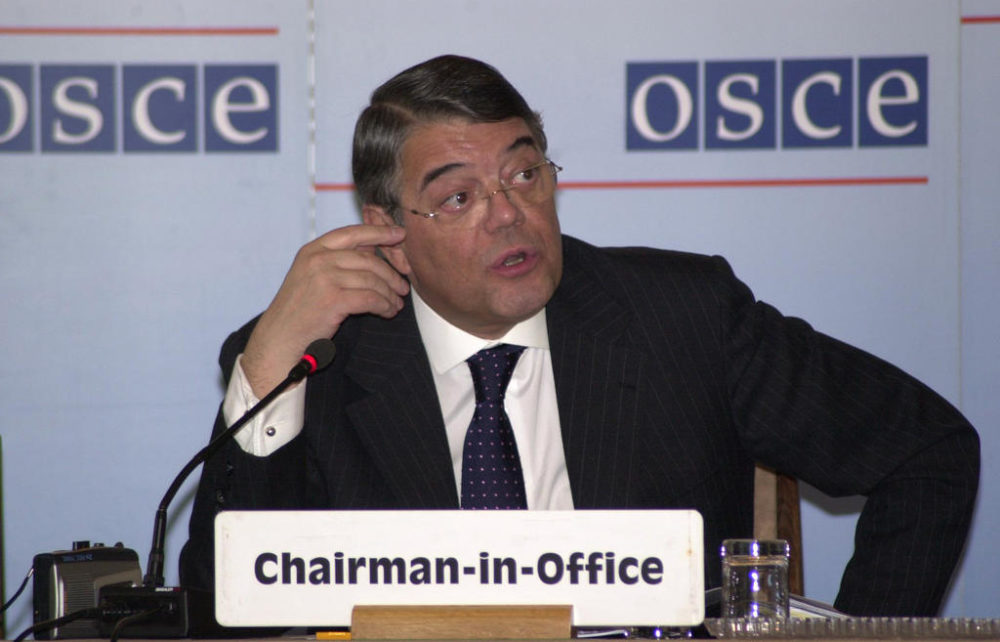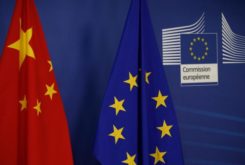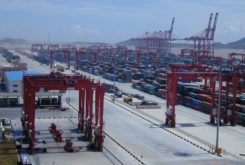Former Portuguese Foreign Minister, Ambassador António Martins da Cruz warns that the current trade war between the US and China could be just the first stage of a more severe dispute, that evolves into a technological war, a political one and, at the last stage, a military dispute like the one during the height of the Cold War. Portugal, he warns, should have a “pragmatic approach” to the escalation.
Martins da Cruz , who spoke last Friday at the “China and the new geopolitics” conferences organized by the Portuguese East Indies Company, was the negotiator on the Sino-Portuguese Joint Liaison Group as diplomatic advisor of the Prime-Minister, Aníbal Cavaco Silva.
“China is a strategic, economic and financial partner for many countries in the European Union. For example, in the European Union, it is estimated that there are at least three to four million jobs that directly depend on the EU Member States’ trade with China and that is why I think that we must have more and more, especially the Portuguese, a more pragmatic approach than ideological one in our relations with China”, said Martins da Cruz.
The ambassador´s previous postings include Geneva on the UN Human Rights Committee, where he gained notoriety for the support of Timor-Leste, and NATO Headquarters.
“Looking at China’s relations with the EU’s 28 member-states, even prior to BREXIT, which still includes the United Kingdom, China 40 years ago represented less than 0.1 percent in world trade and today it represents almost 18 percent and China is the EU’s largest partner. But for China, the first partner is still the United States of America”, said Martins da Cruz.
Germany, he says, accounts for 30 percent of the EU trade with China, meaning the major European economic power, with five thousand German companies established in China that employ 1.2 million Chinese. Trade figures between Germany and China are bigger than the Chinese trade relations with France, Italy and the United Kingdom all together.
The Portuguese diplomat explained that is why many European politicians suddenly are now concerned on these trade relations with China and above all with the Chinese investment in Europe.
“I think it is a concern that is not based on statistics because if we look at the statistics of the last few years, Chinese investment in Europe represents 2.2 percent of total foreign investment in the EU while 38 percent of that investment comes from USA and Canada. According to statistics from the European Commission in Brussels, in 2016 the USA represented 29 percent of purchases of European companies while China only had nine percent and in 2017, one year later, the Americans made a total of 46 percent of European company purchases and only seven percent were done by the Chinese companies. Despite these figures, the EU is divided in terms of trade with China and even China’s strategic and economic importance”.
When it comes to scrutinizing China´s moves in the world stage the Portuguese diplomat and Vice-President of the Alliance Party is sure that China’s great softpower project is “One Belt, One Road”, that more than 100 countries have already joined, including including Portugal and other 16 of the 27 UE member states.
The diplomat concludes that in fact, there are two groups of European countries that have different reactions and acceptance to and of the Chinese investment and presence: those that want to implement the mechanism for supervising Chinese investments, a group captained clearly by France, and those that are receptive to the Chinese investment and who defend closer economic ties with China, normally the southern countries like Portugal, Spain, Italy and Greece, but also the United Kingdom which is the European country with the largest total Chinese investment and Finland, which is the country with the largest Chinese investment per capita.
”That is why some worrisome positions that have been taken by the French minister of economy and finance concerning the limitation on foreign investment and above all to fight against China’s dependence on supply chains, not only on medicines or pharmaceuticals, but on auto parts, on chips, phones, computers, the digital world, when the French minister came to say recently that there would only be support for French companies that had all production in France”, Martins da Cruz said. This, he added, “is completely impossible” and will make products substantially more expensive.
Focusing on the current trade war between China and the US the former Portuguese Foreign Minister warns that it “is more tactical than strategic” because the “dependency of the USA on China is much less than what the media makes us to believe, and Chinese exports to the USA represent only four percent of the Chinese GDP, while US exports to China are 0,6 percent of American GDP”.
Ambassador António Martins da Cruz foresees in the future that “the confrontation will not be economic, but strategic, technological, political and one day there may even be a military confrontation as there was during the cold war”.
Portugal, Martins da Cruz recalled, is the European country that has known China for more years, having been the first to arrive by sea in 1516 and establish relations. Evidence of the positive relations have endured is that the first countries that immediately said they were going to support Antonio Guterres’ candidacy to UN Secretary General were China and the Asian countries, as well as the successful handover of Macau.
“We as Portuguese have been living in China, in Macau, China, for hundreds of years, centuries and the Portuguese born in Macau are a strategic asset that we as State do not always take into consideration and above all I say with pity that Portuguese companies have not always taken in consideration too”, said the diplomat.
“Look at the differences in reality between the situation in Macau and Hong Kong in the current times and this generates a positive perception in the international community, the political community and the community of economic decision makers and objectively Macau is today, inserted in the Great Bay Area project, an important factor for the new dynamics of China’s globalization”, he added.
China has invested more than nine billion dollars in Portugal in addition to around two billion under the golden visa program and Macao’s role as a platform between China and Portuguese-speaking countries, not only serves as a mechanism for achieving economic gains, but also for contributing to international stability.
The hope and opportunity perceived by the former Foreign Minister of Portugal is “perhaps now with the integration of Macau into the Greater Bay Area and what it will mean for the Portuguese companies in Hong Kong and Shenzhen”, and the Chinese support for the establishment of financial market in Macau, that “may arise new interest from Portuguese banks, financial institutions and Portuguese companies”.
A positive example, Martins da Cruz added, is Caixa Geral de Depósitos banking group, which owns Macau´s Banco Nacional Ultramarino (BNU), and Carlos Álvares, BNU CEO, who has been leading negotiations with the Monetary and Exchange Authority of Macau for BNU to remain as issuer of the local currency, the Pataca.




